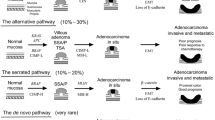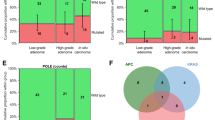Abstract
PURPOSE: In view of the changing concept of colorectal carcinogenesis during the last 20 years, a historical review of colorectal carcinogenesis is presented. METHODS: The changing concept of colorectal carcinogenesis was presented in four different periods: 1) carcinogenesis based on surgical materials; 2) carcinogenesis based on polypectomy materials; 3) carcinogenesis based on nonpolypoid neoplasms; 4) carcinogenesis based on molecular biology. RESULTS: In the first period, large adenomas were thought to play the most important role as precursors to colorectal carcinomas; however, in the second period, smaller and nonpedunculated adenomas were found to have a much higher malignancy potential than previously thought. The discovery of nonpolypoid neoplasms, including flat and depressed adenomas/carcinomas, shed light on the new precursor of colorectal carcinomas that were not recognized in the past. Molecular biology clarified a lack of K -ras mutation in nonpolypoid, particularly depressed, neoplasms, suggesting the presence of a novel pathway of colorectal carcinogenesis, different from that in polypoid neoplasms. CONCLUSIONS: The concept referred to as the “adenoma-carcinoma sequence” changed because colonoscopic polypectomy specimens were studied, and rather small, nonpedunculated adenomas were found to play an important role as precursors of colorectal carcinomas. The discovery of nonpolypoid neoplasms provides us with new precursors of colorectal carcinomas. The genetic alterations in nonpolypoid neoplasms seem to differ from those in polypoid neoplasms, and genetic alterations in so-called de novo carcinomas need to be clarified
Similar content being viewed by others
References
Muto T, Bussey HJ, Morson BC. The evolution of cancer of the colon and rectum. Cancer 1975;36:2251–70.
Potet F, Soullard J. Polyps of the rectum and colon. Gut 1971;12:468–82.
Spratt JS Jr, Ackermann LV. Small primary adenocarcinoma of the colon and rectum. JAMA 1962;179:337–46.
Wolff WI, Shinya H. Polypectomy via the fiberoptic colonoscope: removal of neoplasms beyond reach of the sigmoidoscope. N Engl J Med 1973;288:329–32.
Muto T, Kamiya J, Sawada T,et al. Colonoscopic polypectomy in diagnosis and treatment of early carcinoma of the large intestine. Dis Colon Rectum 1980;23:68–75.
Ushio Y, Shima Y, Goto Y,et al. Growth and progression of colorectal cancer: retrospective study based on roentgenologic findings (in Japanese). Stomach Intest 1985;20:843–58.
Muto T, Kamiya J, Kusama S, Umeda N. Rapid evolution of colon cancer from a colonic polyp: report of two cases. Am J Proctol Gastroenterol Colon Rectal Surg 1982;33:15–8.
Muto T, Kamiya J, Sawada T, Morioka Y. Morphogenesis of human colon cancer. Dis Colon Rectum 1983;26:257–62.
Muto T, Kamiya J, Sawada T,et al. Small “flat adenoma” of the large bowel with special reference to its clinico-pathologic features. Dis Colon Rectum 1985;28:847–51.
Lynch HT, Smyrk T, Lanspa SJ,et al. Flat adenoma in a colon cancer-prone kindred. J Natl Cancer Inst 1988;80:278–82.
Wolber RA, Owen DA. Flat adenomas of the colon. Hum Pathol 1991;22:70–4.
Adachi M, Muto T, Okinaga K, Morioka Y. Clinicopathologic features of the flat adenoma. Dis Colon Rectum 1991;34:981–6.
Adachi M, Muto T, Morioka Y, Ikenaga T, Hara M. Flat adenoma and flat mucosal carcinoma (IIb type)—a new precursor of colorectal carcinoma: report of two cases. Dis Colon Rectum 1988;31:236–43.
Kudo S, Hayashi S, Takano Y,et al. The clinicopathological features of flat and depressed types of early colorectal cancer (in Japanese). Stomach Intest 1989;24:317–29.
Iishi H, Tatsuta M, Tsutsui S,et al. Early depressed adenocarcinomas of the large intestine. Cancer 1992;69:2406–10.
Masaki T, Muto T, Suzuki K. DNA ploidy patterns of colorectal adenoma: a microspectrophotometric study. Gastroenterol Jpn 1991;26:721–7.
Muto T, Masaki T, Suzuki K. DNA ploidy pattern of flat adenomas of the large bowel. Dis Colon Rectum 1991;34:696–8.
Vogelstein B, Fearon ER, Hamilton SR,et al. Genetic alterations during colorectal tumor development. N Engl J Med 1988;319:525–32.
Ando M, Maruyama M, Oto M, Takemura K, Endo M, Yuasa Y. Higher frequency of point mutations in the c-K-ras 2 gene in human colorectal adenomas with severe atypia than in carcinomas. Jpn J Cancer Res 1991;82:245–9.
Fujimori T, Nagasako K, Satonaka K,et al. Expression of oncogene product (P-21) and point mutation of Ki-ras codon 12 in superficial early colorectal cancer (in Japanese). Stomach Intest 1992;27:111–7.
Yamagata S, Muto T, Uchida Y,et al. Lower incidence of K-ras codon 12 mutation in flat colorectal adenomas than in polypoid adenomas. Jpn J Cancer Res 1994;85:147–51.
Shimoda T, Ikegami M, Fujisaki J, Matsui T, Aizawa S, Ishikawa E. Early colorectal carcinoma with special reference to its developmentde novo. Cancer 1989;64:1138–46.
Yamagata S, Masaki T, Sawada T, Muto T, Hirooka T. Colon cancer development from superficial type adenoma: from a molecular biological point of view (in Japanese). Stomach Intest 1995;30:173–7.
Yamagata S, Muto T, Uchida Y,et al. Polypoid growth and K-ras codon 12 mutation in colorectal cancer. Cancer 1995;75:953–7.
Author information
Authors and Affiliations
Additional information
Supported in part by a Grant-in-Aid for Cancer Research from the Ministry of Education, Science and Culture and from the Ministry of Health and Welfare of Japan.
About this article
Cite this article
Muto, T., Nagawa, H., Watanabe, T. et al. Colorectal carcinogenesis. Dis Colon Rectum 40 (Suppl 10), S80–S85 (1997). https://doi.org/10.1007/BF02062026
Issue Date:
DOI: https://doi.org/10.1007/BF02062026




